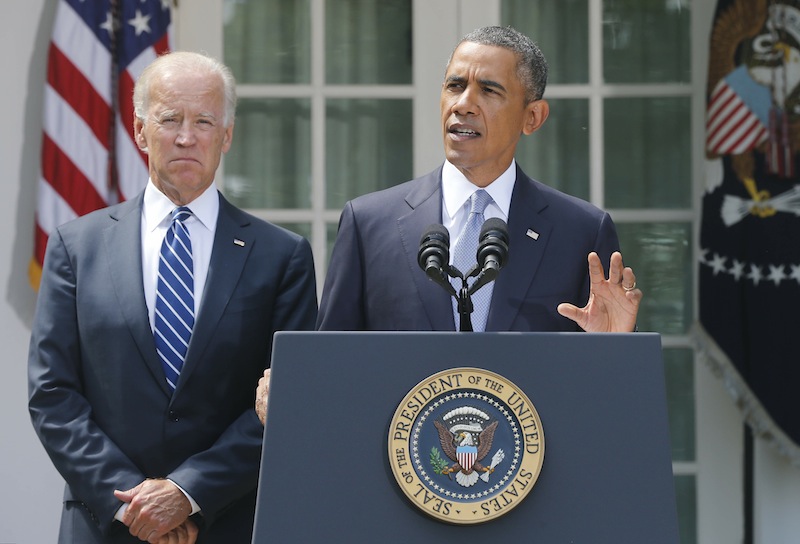Several Republicans were outspoken supporters of a U.S. intervention in Syria as a brutal civil war continues to ravage the country. But ever since President Barack Obama not only came out for military action in the wake of the regime’s alleged use of chemical weapons but also asked for congressional consent for strike, a number of those Republicans have turned against intervention, for one reason or another.
Here are five examples.
1) Senate Armed Services Ranking Member James Inhofe (R-OK)
BEFORE: “Although any course of action by the United States in Syria has risk, so does inaction. The longer Assad remains in power, the larger the number of destabilizing refugees that will enter neighboring countries, the more insecure his chemical weapons, and the stronger extremist Islamists become.
“A solution to Syria will not be easy. … But just because the choices before us are hard doesn’t mean the United States has the luxury of sitting on the sidelines and doing nothing. Syria, given its longstanding ties to Iran, Russia and terrorism, is not and has never been a problem that can be wished away.”
— USA Today op-ed, May 9, 2013
AFTER: “The state of our military today cannot afford another war. The President has decimated our military by cutting its budget by $487 billion and putting another $500 billion more on the chopping block with his sequestration. …
“As a superpower, we have a responsibility to follow through on what we say and ensure the security of our allies and partners. We must also ensure our military has the means to fulfill those responsibilities. Our President has failed to live up to those responsibilities.”
— Inhofe statement after classified briefing on Syria, Sept. 4, 2013
2) Sen. Marco Rubio (R-FL)
BEFORE: “The fall of Assad would be a significant blow to Iran’s ambitions. On those grounds alone, we should be seeking to help the people of Syria bring him down. … Finally, the nations in the region see Syria as a test of our continued willingness to lead in the Middle East. If we prove unwilling to provide leadership, they will conclude that we are no longer a reliable security partner, and will decide to take matters into their own hands. … The most powerful and influential nation in the world cannot ask smaller, more vulnerable nations to take risks while we stand on the sidelines. We have to lead because the rewards of effective leadership are so great.”
— Speech to Brooking Institution, April 25, 2012
AFTER: “While I have long argued forcefully for engagement in empowering the Syrian people, I have never supported the use of U.S. military force in the conflict. And I still don’t. I remain unconvinced that the use of force proposed here will work. The only thing that will prevent Assad from using chemical weapons in the future is for the Syrian people to remove him from power.”
— Remarks at Foreign Relations Committee hearing, Sept. 4, 2013
3) Sen. Ted Cruz (R-TX)
BEFORE: “Right now we need to develop a clear, practical plan to go in, locate the weapons, secure or destroy them, and then get out. We might work in concert with our allies, but this needs to be an operation driven by the mission, not by a coalition. The United States should be firmly in the lead to make sure the job is done right.”
— Congressional record, June 20, 2013
AFTER: “I think a military attack is a mistake. For two reasons. One because I think the administration is proceeding with the wrong objective, and two, because they have no viable plan for success. They are beginning from the wrong objective because this attack is not based on defending U.S. national security. … I don’t think that’s the job of our military to be defending amorphous international norms. There are many other steps we can do to express strong disapproval to Assad’s murderous conduct, But I don’t think it’s the job of the military.”
— Transcript of Cruz interview on ABC’s “This Week,” Sept. 8, 2013
4) Rep. Michael Grimm (R-NY)
BEFORE: “I am supporting the president on this. He is going to have to strike. He should use our superior air power, our naval power. These should be targeted strikes to disable their air force and where they hold their chemical weapons. The strikes should be at hard targets, like their airfields.”
— Remarks to Staten Island Advance, Aug. 31, 2013
AFTER: “When President Obama announced his plans to strike Syria in response to the discovery that the Assad regime used chemical weapons to kill thousands of men, women and children; my initial reaction, as a Marine combat veteran, was to stand by the Commander in Chief and support immediate, targeted strikes. … Unfortunately, the time to act was then and the moment to show our strength has passed. … Thus, after much thought, deliberation and prayer, I am no longer convinced that a U.S. strike on Syria will yield a benefit to the United States that will not be greatly outweighed by the extreme cost of war.”
— Grimm statement, Sept. 5, 2013
5) Rep. Mike Coffman (R-CO)
BEFORE: “I will support the president should he conduct a limited strike on Syria in order to deter (Syrian President) Assad from further use of chemical weapons, but I would not support involvement beyond that because this is an intractable sectarian struggle.”
— Article in Denver Post, Aug. 27, 2013
AFTER: “I’m undecided at this point. There are three questions that I will be asking during the debate on Syria before making my decision. The first is how strong is the evidence that the Assad regime directed a chemical attack against civilians? The second is whether a limited strike would be effective in deterring Assad from the further use of chemical weapons? My third question will be whether a limited strike could ultimately drag the United States into an intractable sectarian civil war in Syria?”






